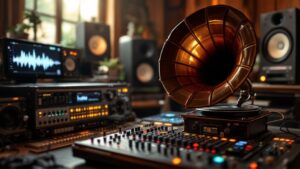The Rich History and Evolution of Opera Singing
Opera singing's powerful story spans centuries, blending artistry with musical tradition. For aspiring singers, knowing this history adds depth and context to their practice and performance.
The Birth of Opera and the Rise of the Castrati
Opera emerged in Italy during the early 1600s as a new art form combining music, drama, and vocals. The era saw the rise of castrati – male singers castrated before puberty to preserve their high voices. These performers dominated as the 'primo uomo' (lead male roles), bringing unique vocal qualities to operatic characters. Most of today's major opera works were composed in the 18th and 19th centuries, establishing conventions still used today. Learn more about this fascinating period in this academic paper on opera history.
The Golden Age of Opera and Bel Canto
The 18th and 19th centuries marked opera's Golden Age, featuring the refined bel canto style. This approach emphasized beautiful melodies, vocal agility, and ornate musical decoration. Great composers like Rossini, Bellini, and Donizetti created works specifically to showcase bel canto singers' amazing technical abilities. Their compositions set new standards for vocal excellence.
The Evolution of Opera in the 20th Century and Beyond
The 20th century brought fresh changes as composers like Puccini, Strauss, and Wagner explored new harmonies and dramatic forms. Singers needed to develop greater vocal power and emotional range to perform these works. Today's opera continues to grow, mixing different musical styles and telling new stories. Modern singers must master both classic and current styles.
Connecting the Past with the Present in Opera Singing Lessons
Modern opera lessons blend historical knowledge with current techniques. Understanding opera's rich past helps singers grasp the subtle differences between styles and bring deeper meaning to their performances. Studying how great singers of the past approached their craft offers valuable insights into voice production and artistic expression. For instance, the bel canto style's focus on breath control remains essential for developing precise vocal control. This connection between past and present creates a richer learning experience and helps singers form a deeper bond with this enduring art form.
Essential Components of Professional Opera Training
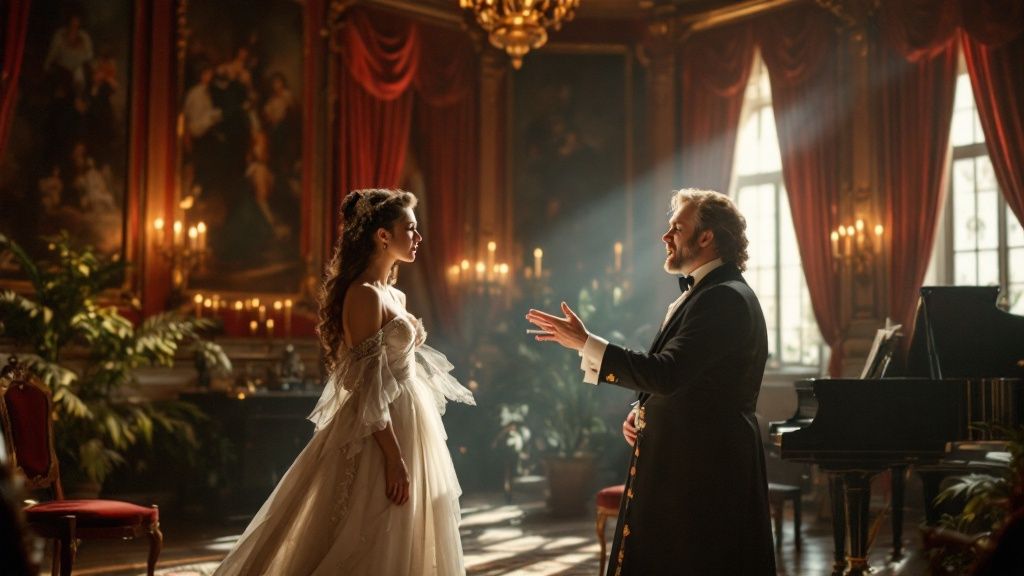
Want to perform opera on the world's great stages? The path requires mastering several key skills beyond just singing the right notes. Let's explore what it takes to build a strong foundation as an opera singer.
Building a Foundation: Technique and Breath Control
At its core, opera relies on vocal technique. Just like any instrument requires careful maintenance, a singer's voice needs dedicated training and care. The most fundamental skill is breath control – the ability to manage airflow for powerful, sustained notes. Singers spend countless hours practicing diaphragmatic breathing exercises to build this essential capability.
Posture and Resonance: Optimizing Your Instrument
Good posture unlocks proper breathing and sound production. Think of your body as a natural amplifier – the chest and head cavities act like the body of a guitar, enriching and projecting the voice. Professional singers work to align their bodies perfectly to create rich, resonant tones that fill concert halls.
The Importance of Language and Diction
Opera demands excellent language skills and clear diction. Most operas are performed in Italian, French, German, or Russian, making language study essential. Each word must be crystal clear so audiences can follow the story and emotional journey. The training process often starts young to build these skills naturally. Learn more about becoming an opera singer at Berklee College of Music.
Artistry and Interpretation: Bringing the Story to Life
Finally, opera requires deep artistic interpretation. Singers must fully inhabit their characters while delivering complex musical passages. This means understanding the story, the emotions, and how to convey them through both voice and movement. Great opera combines technical mastery with genuine dramatic expression to move audiences deeply.
Mastering Vocal Techniques for Opera
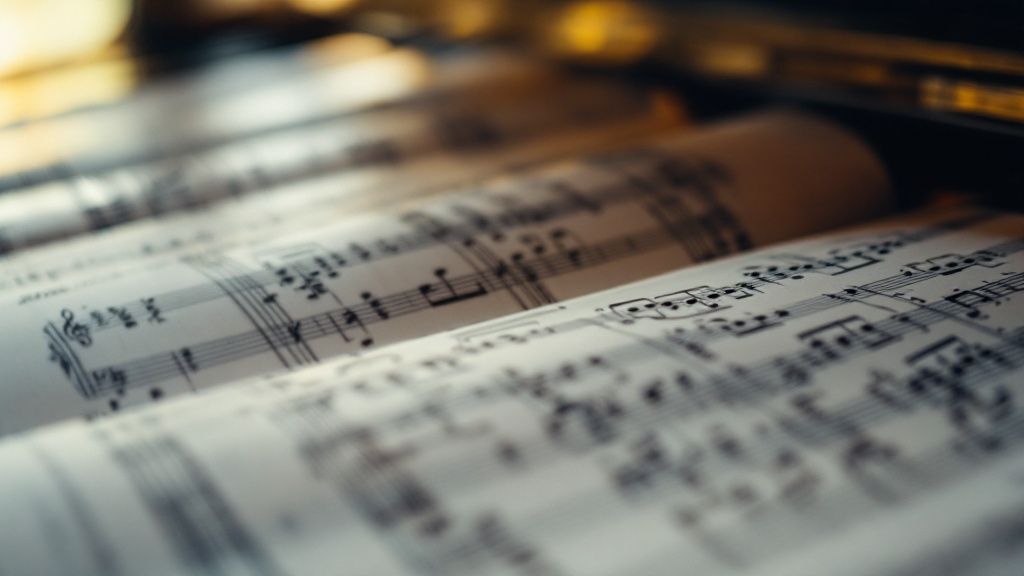
Learning to sing opera requires mastering several core techniques. Professional training focuses on developing your voice into a powerful instrument that can convey deep emotions while handling complex musical passages. Let's explore the key elements that form the foundation of opera singing.
Breath Support: The Foundation of Opera Singing
Proper breathing is essential for opera singing. The diaphragm and intercostal muscles work together to control airflow, much like an archer drawing and releasing a bow. This precise control allows singers to project their voices over an orchestra and fill concert halls without strain. Good breath support gives singers the power and control needed for those soaring high notes and long phrases.
Resonance: Shaping and Amplifying Your Voice
Your body's natural resonators – the chest, throat, and head cavities – work like the body of a guitar to amplify sound. Opera singers learn to adjust their mouth and throat positions to shape different tonal qualities. Through proper resonance, singers create rich, full sounds that carry effortlessly through performance spaces.
Developing Vibrato: The Hallmark of Opera
The slight pitch oscillation known as vibrato adds warmth and expression to operatic singing. A well-developed vibrato comes from relaxed, balanced vocal production – it should feel natural, not forced. Think of it as a gentle pulse that enhances the beauty of each note rather than an exaggerated wobble.
Vocal Flexibility and Agility: Navigating Complex Melodies
Opera music often includes challenging runs, leaps between notes, and intricate passages requiring vocal flexibility and agility. Like a gymnast perfecting routines, singers build vocal dexterity through focused practice. Daily exercises help develop the control needed to execute fast passages while keeping each note clear and distinct.
Troubleshooting Common Vocal Challenges
Even experienced singers face technical hurdles. Vocal strain from incorrect breathing or throat tension is a common issue. Maintaining consistent tone quality across different vocal ranges also takes work. Regular practice, proper warm-ups, and guidance from vocal coaches help singers identify and fix these challenges. The key is addressing problems early before they become habits.
Language and Expression in Opera
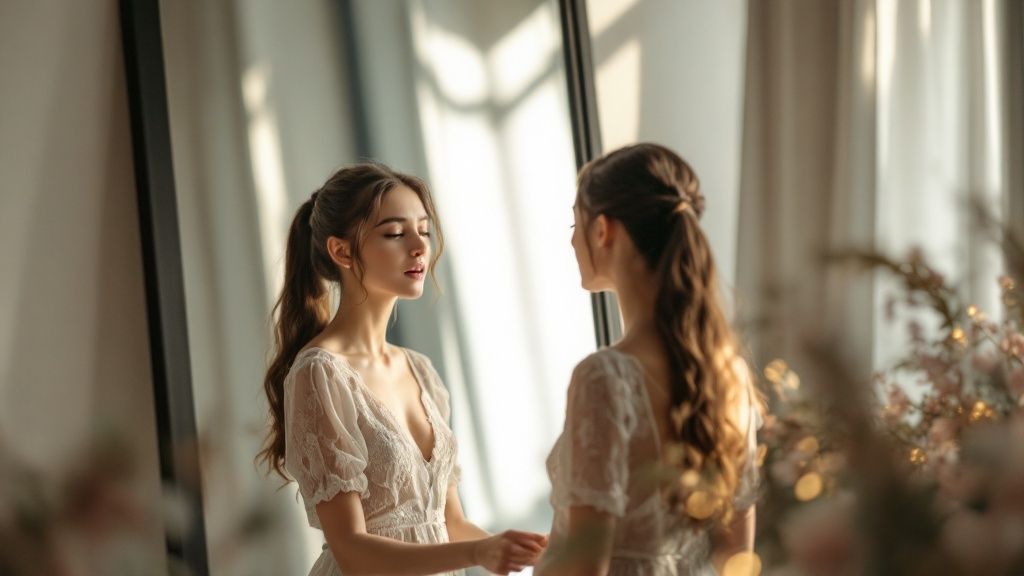
When learning to sing opera, mastering language and expression skills is essential. Opera singers must not only perform in multiple languages but also bring complex characters and stories to life through emotional depth. Learning Italian, German, and French goes far beyond proper pronunciation – it's about fully inhabiting a role and authentically sharing a character's journey with the audience.
Mastering Diction and Emotional Expression
Clear diction – the precise articulation of every word – is fundamental for opera singers. Language coaches teach singers to combine accurate pronunciation with emotionally authentic delivery. The goal is natural, expressive communication that moves seamlessly between languages while maintaining clarity.
Multilingual Mastery and Character Embodiment
Performing opera in multiple languages requires both technical skill and emotional understanding. Key elements include:
- Deep Text Analysis: Understanding both literal translation and dramatic significance
- Language-Specific Sound Training: Learning the unique qualities of each language's pronunciation
- Emotional Connection: Drawing from personal experiences to bring authenticity to roles, as demonstrated by mezzo-soprano J'Nai Bridges in her powerful performances
Practical Techniques for Interpreting Libretto
To bring operatic texts to life, singers must:
- Study character backgrounds and motivations for nuanced portrayals
- Use real-life experiences to tap into genuine emotions
- Work closely with directors and language specialists to understand cultural context
The heart of opera lies in forging genuine connections – between singer and text, performer and audience. By developing these essential language and expression skills, artists can create truly memorable operatic moments that resonate deeply with listeners.
Building Your Opera Repertoire
A strong opera repertoire is essential for any singer's growth and success. It's similar to crafting a balanced menu – you need diversity and depth that matches your unique voice. The pieces you select should both display your strengths and help you develop as a performer.
Strategic Repertoire Building: From Arias to Roles
Building a repertoire takes careful planning. Successful opera singers select pieces that highlight their vocal strengths while targeting areas for improvement. Most start with single arias, then progress to scenes, and finally take on complete roles. Think of it like constructing a building – you begin with the foundation (arias), add the structure (scenes), and finish with the roof (full roles).
Repertoire by Voice Type and Career Stage
Each voice type requires specific repertoire suited to their range and vocal qualities. For example, coloratura sopranos often focus on pieces showing off agility and high notes, while dramatic baritones need material demanding power and richness. Your career stage also matters – start with simpler pieces to build good technique before attempting challenging Verdi or Wagner roles. As mezzo-soprano J'Nai Bridges notes, mastering basics is key, just as basketball players perfect fundamental shots before complex plays.
Choosing the Right Pieces: Expert Recommendations
Your choice of pieces significantly impacts your development. Here's what vocal coaches and experienced singers recommend considering:
- Vocal Fit: Is the range comfortable? Does the tessitura suit your voice?
- Dramatic Suitability: Can you connect with the character? Does the music let you express yourself naturally?
- Performance Opportunities: Will you have chances to perform these pieces?
- Long-Term Goals: Do the selections align with your career path?
Sample Progression Plan for Opera Singers
Here's a typical progression path:
| Career Stage | Repertoire Focus | Example Pieces |
|---|---|---|
| Early Stages | Simple arias and art songs | "Caro mio ben" by Giordani, "Lascia ch'io pianga" by Handel |
| Intermediate | More complex arias and scenes | "Queen of the Night Aria" by Mozart, "Vissi d'arte" by Puccini |
| Advanced | Complete roles and challenging operatic excerpts | Violetta in La Traviata by Verdi, Tosca in Tosca by Puccini |
Working with experienced teachers and considering these elements helps create a repertoire that serves your voice and tells your unique artistic story. Good opera lessons guide you through selecting pieces that help you reach your full potential.
Preparing for Performance and Auditions
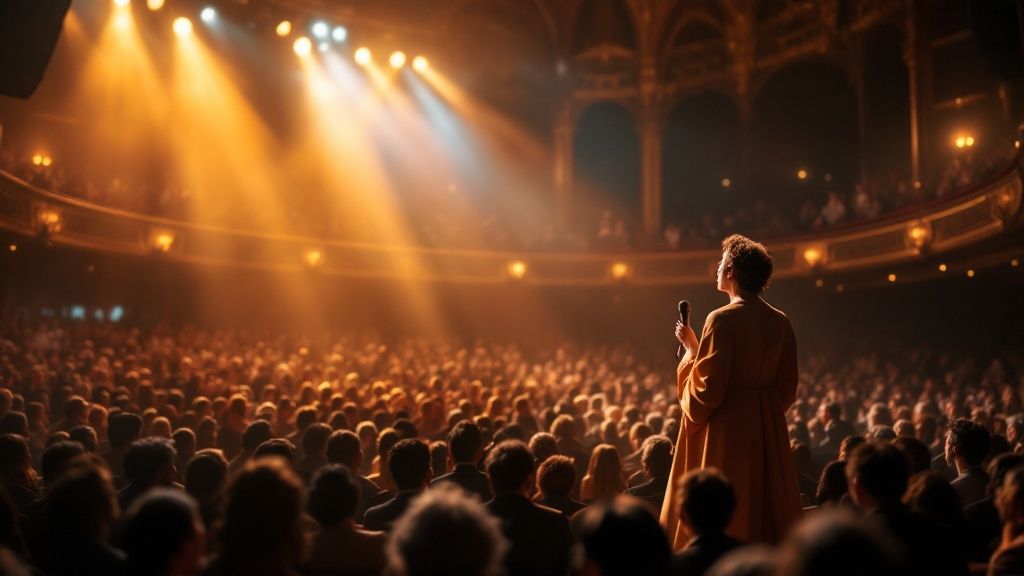
Taking the stage requires both technical ability and mental fortitude. According to mezzo-soprano J'Nai Bridges, great performances come from preparing both mind and body. Research shows that 60% of musicians deal with performance anxiety, making smart preparation essential.
Mental Preparation Techniques
- Focus and Mental Practice: Picture yourself on stage – from your entrance to the final bow. Deep breathing exercises help steady nerves and build confidence.
- Pre-Show Routine: Create a reliable warm-up sequence with vocal exercises and relaxation methods that work for you.
Building Strong Stage Presence
Your stage presence develops through practice and observation. The Barre Opera blog recently highlighted key elements that successful singers share:
- Physical Confidence: Use open, grounded postures that help you connect with your audience
- Emotional Range: Understand your character's feelings and motivations to create authentic performances
Audition Success Tips
Auditions let you showcase your skills and professionalism. First impressions matter significantly, so keep these points in mind:
- Professional Preparation: Get there early with all materials ready – your music, forms, and anything else required
- Smart Song Selection: Pick pieces that display your vocal strengths and versatility, building on what you've learned in your singing lessons
By combining solid mental preparation with strong technique, you'll be ready to deliver confident, genuine performances that stand out. Regular opera singing lessons and putting these expert tips into practice creates a foundation for success in both performances and auditions.










